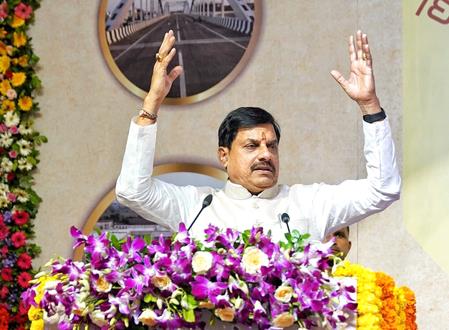Waqf Act: SC's Verdict A Reply To Those Who Questioned PM Modi's Intentions, Says MP CM
Chief Minister Yadav said that with the court's judgment has also come a response to those who were questioning Prime Minister Narendra Modi's intention when the Waqf (Amendment) Bill was passed in Parliament.
"The Supreme Court has pronounced its judgment, which has cleared the way for its implementation. People of the country have full faith in Prime Minister Modi that this law will be implemented across the country," Yadav said talking to media persons in Bhopal.
Cabinet Minister in Madhya Pradesh Government, Vishvas Sarang claimed that the Bill was opposed by those who had misused the Waqf's properties for this own benefit.
Speaking specifically about the Waqf's properties in Madhya Pradesh, the BJP minister alleged that a group of Muslim leaders, who have encroached on the Waqf Board's land and constructed buildings, were trying to mislead the people from the minority community.
"Most of the big Muslim leaders have encroached and constructed buildings on Waqf Board properties, and now they are misleading the poor people from their own community through wrong interpretation of the Waqf Act," Sarang told IANS on Monday.
He was indirectly referring to Congress MLA Arif Masood, a key leader from the Muslim community in Madhya Pradesh, who not only opposed the Bill and organised protests in Bhopal, but has also filed a petition in the Supreme Court.
The Supreme Court on Monday upheld the Centre's provisions made in the Waqf Amendment Act, 2025 while also stalling some key provisions of the Act, including the clause that only a practising Muslim of five years can dedicate a property as Waqf.
The Supreme Court declined to stay the Waqf (Amendment) Act, 2025 in its entirety, observing that a statute carries a presumption of constitutionality and can be stayed only in the rarest case.
However, a Bench of Chief Justice of India (CJI) B.R. Gavai and Justice A.G. Masih stayed the provision mandating five years of practising Islam for the creation of Waqf until relevant rules are framed.
Further, the CJI Gavai-led Bench stayed the provision empowering a designated officer to decide disputes on whether a Waqf property has encroached upon government land, observing that an executive officer cannot adjudicate on citizens' property rights, as this would violate the principle of separation of powers.
“Till adjudication happens by the tribunal, no third-party rights can be created against any parties,” it said.
In its interim order, the apex court directed that state Waqf Boards should have no more than three non-Muslim members, while the Central Waqf Board will not have more than four non-Muslim members.
The Bench also refused to stay the mandatory registration of Waqf properties, noting that the requirement had existed under earlier enactments as well.

Legal Disclaimer:
MENAFN provides the
information “as is” without warranty of any kind. We do not accept
any responsibility or liability for the accuracy, content, images,
videos, licenses, completeness, legality, or reliability of the information
contained in this article. If you have any complaints or copyright
issues related to this article, kindly contact the provider above.
Most popular stories
Market Research

- BTCC Summer Festival 2025 Unites Japan's Web3 Community
- Ethereum Based Meme Coin Pepeto Presale Past $6.6 Million As Exchange Demo Launches
- Ecosync & Carboncore Launch Full Stages Refi Infrastructure Linking Carbon Credits With Web3
- Invromining Expands Multi-Asset Mining Platform, Launches New AI-Driven Infrastructure
- BTCC Announces Participation In Token2049 Singapore 2025, Showcasing NBA Collaboration With Jaren Jackson Jr.
- Innovation-Driven The5ers Selects Ctrader As Premier Platform For Advanced Traders
















Comments
No comment